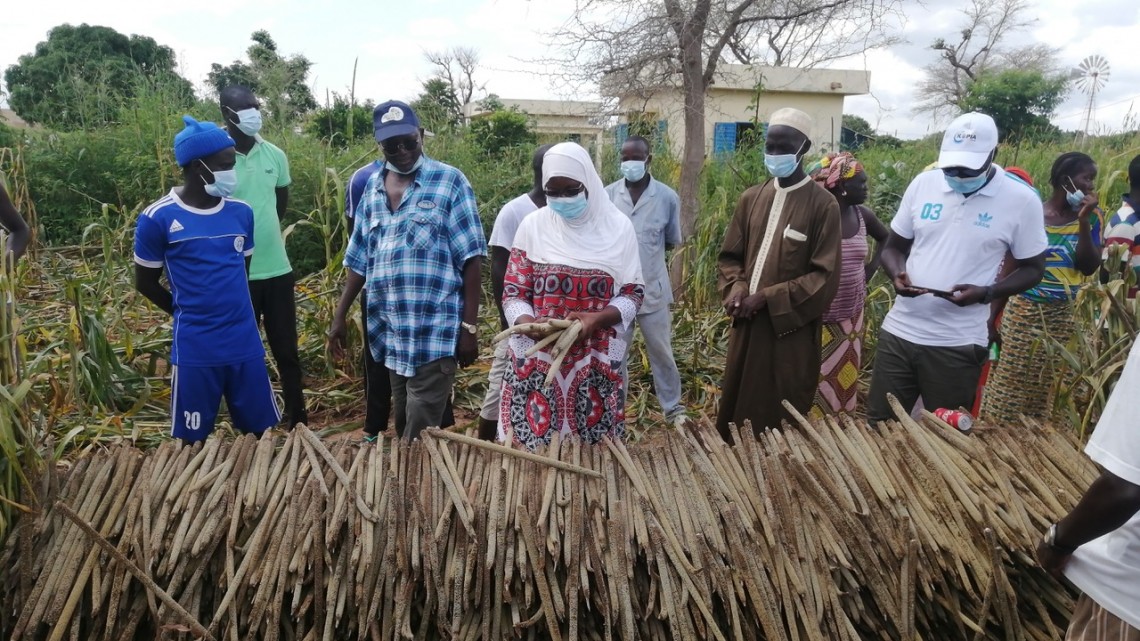
Breeders and smallholder farmers review pearl millet trials in Senegal.
News directly from Cornell's colleges and centers
Pioneering an inclusive approach to priority setting in crop improvement
By Kelly Merchan
The processes for breeding programs to set priorities are variable. The most developed approaches focus on ex-ante evaluations and economic projections of impact. At the Feed the Future Innovation Lab for Crop Improvement, we want to do more: How do we bake in a central focus on social impact — youth employment, climate change resilience, nutrition, gender equality, amongst others — that are inherently intertwined with any part of the food system?
The Innovation Lab, housed in the College of Agriculture and Life Sciences’ Department of Global Development, is at the forefront of the global conversation about how breeding priorities fit alongside power, politics and long-term impact.
Our “Impact Centered Varietal Design Framework” currently under development takes a human-centric approach to help National Agricultural Research Institutes (NARIs) assess their breeding priorities, challenge their assumptions, perform engaged research and ultimately prioritize the impact they want to make through crop improvement. This approach has garnered international attention in a short amount of time, with invitations to present at the Bill & Melinda Gates Foundation, Bayer Crop Science and Excellence in Breeding Platform.
The Innovation Lab’s priority setting team, co-led by Hale Ann Tufan, associate director, and Miguel Gomez, Robert G. Tobin Associate Professor of Applied Economics and Management, encourages breeders to approach their priorities critically and consistently.
For example, if a NARI wants to breed for increased iron content in order to alleviate an iron deficiency, the approach would bring in critical checkpoints to ask if target beneficiaries eat enough of that crop, whether the fortification levels are enough to affect the deficiency, or whether the germplasm has enough material to bring in that iron content.
“We want to challenge breeding programs to identify assumptions from the onset, and develop a conceptual process that focuses attention on social impacts, while ensuring these impact claims are achievable,” shares Tufan.
Why does our contribution to this conversation matter? Plant breeders in the public sector are uniquely positioned to promote equity in the food system at the national level. At the Innovation Lab interdisciplinarity is a central tenet, and we encourage plant scientists and social scientists to work together to confront common barriers and ask critical questions: Whose voices are being heard? Who is making the decisions? What assumptions are being made? Who is growing, processing and consuming the crop, and how can they benefit from crop improvement?
Answering these questions in ways that boost crop improvement is a balance between critical thinking and the adaption of numerous tools. By adapting and customizing these tools, the Innovation Lab seeks to help each NARI reach their full potential. Recognizing that a breeder cannot breed for everything at once, the Innovation Lab’s priority setting team is helping NARIs prioritize, develop strategies and collaborate with stakeholders to achieve optimal impact in their crop improvement programs.
“We need to think critically about how breeding programs operate, because at the end of the day, priority setting can be political,” says Tufan. “Donors have their priorities; programs have their priorities; breeders have their priorities and the nexus of all may end up more exclusive, rather than inclusive.”
Kelly Merchan is a communications specialist in the Department of Global Development.
This article originally appeared on the Feed the Future Innovation Lab for Crop Improvement website.
Media Contact
Get Cornell news delivered right to your inbox.
Subscribe
